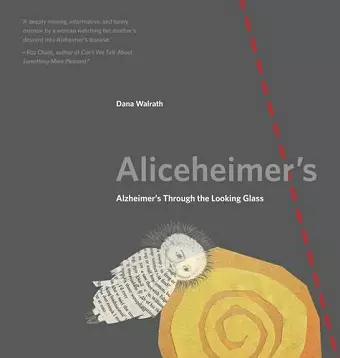Aliceheimer’s
Alzheimer’s Through the Looking Glass
Format:Paperback
Publisher:Pennsylvania State University Press
Published:15th Apr '16
Should be back in stock very soon

“Alice was always beautiful—Armenian immigrant beautiful, with thick, curly black hair, olive skin, and big dark eyes,” writes Dana Walrath. Alice also has Alzheimer’s, and while she can remember all the songs from The Music Man, she can no longer attend to the basics of caring for herself. Alice moves to live with her daughter, Dana, in Vermont, and the story begins.
Aliceheimer’s is a series of illustrated vignettes, daily glimpses into their world with Alzheimer’s. Walrath’s time with her mother was marked by humor and clarity: “With a community of help that included pirates, good neighbors, a cast of characters from space-time travel, and my dead father hovering in the branches of the maple trees that surround our Vermont farmhouse, Aliceheimer’s let us write our own story daily—a story that, in turn, helps rewrite the dominant medical narrative of aging.”
In drawing Alice, Walrath literally enrobes her with cut-up pages from Alice’s Adventures in Wonderland. She weaves elements from Lewis Carroll’s classic throughout her text, using evocative phrases from the novel to introduce the vignettes, such as “Disappearing Alice,” “Missing Pieces,” “Falling Slowly,” “Curiouser and Curiouser,” and “A Mad Tea Party.”
Walrath writes that creating this book allowed her not only to process her grief over her mother’s dementia, but also “to remember the magic laughter of that time.” Graphic medicine, she writes, “lets us better understand those who are hurting, feel their stories, and redraw and renegotiate those social boundaries. Most of all, it gives us a way to heal and to fly over the world as Alice does.” In the end, Aliceheimer’s is indeed strangely and utterly uplifting.
“Sometimes funny, sometimes heart-breaking, each comic weaves in a different facet of [Dana and Alice’s] shared experience: hallucinations, repetition, memory, loss, magic, and sometimes even time travel.”
—Meredith Rizzo NPR Shots
“A deeply moving, informative, and funny memoir by a woman watching her mother’s descent into Alzheimer’s disease. The collaged drawings are a perfect counterpoint to the writing.”
—Roz Chast, author of Can’t We Talk About Something More Pleasant?
“I am grateful for creators like Walrath . . . who make art from experiences like those my patients face. Their works remind us that, even during the throes of illness or grief, when the air is filled with questions, fear, and sadness, there are slivers of time and space where room can be made for wonder.”
—Lynda Montgomery Los Angeles Review of Books
“Walrath offers an anthropological method for dealing with the disease. Observing Alice as if she belongs to an unfamiliar culture, Walrath relates to her in ways that respect her alternate reality. Her stories are mostly lighthearted; her drawings are whimsical, magical, surreal.”
—LaVonne Neff The Christian Century
“Dana Walrath’s images evoke Alice in a way that text alone cannot, creating a symbiotic relationship between text and image in this work. Walrath’s style is gentle and specific, naive and yet quite sophisticated about the past and the present.”
—MK Czerwiec, coauthor of Graphic Medicine Manifesto
“Dana Walrath’s approach to memoir is unique in that she twists together multiple forms—the personal essay, drawings, collage. This approach, which offers the equivalent of memory snapshots presented from different angles, suggests value in appreciating the moment over the supposed stability of the traditional narrative trajectory of beginning, middle, end. Aliceheimer’s echoes the spots of memory that are part of the Alzheimer’s experience and presents end-of-life care in an original and ultimately comforting way.”
—Mita Mahato, University of Puget Sound
“[Aliceheimer’s] offers a brand-new looking glass into Alzheimer's—one that, like Carroll’s mirror, displays a parallel world rather than our own. Walrath dared to follow Alice down the rabbit hole of the disease and emerged with a courageous depiction of a fascinating world below.”
—Nancy Stearns Bercaw Seven Days
“Thoughtful, exploratory, and deeply loving. . . . A book about living with Alzheimer’s that gives voice to both caretaker and, insofar as is possible, patient. In this dialogue, illustration helps Alice’s actual words subvert empathic inaccuracy, and challenge our fears.”
—Emily Wojcik Massachusetts Review
“Original in its collage approach, and buoyant in its message of how to ‘bring back the humanity of a person with dementia’. . . . Aliceheimer’s is a story about the possibility to find quality of life in dementia caregiving; the possibility to see Alzheimer’s disease as creating a new self, a self that can be lived with and written about up to the moment when we feel threatened in our own self.”
—Martina Zimmermann Medical Humanities
“The world is so lucky that Walrath took on this ‘hard job’ of working through the ‘unfinished business’ with her mother. The raw honesty in the images and words bring humanity to the disease so often talked about in catastrophic terms.”
—Erin Partridge Graphic Medicine
“As a member of the healthcare profession who is also experiencing the challenges of Alzheimer's with my own mother, this book offered clarity I can share not only with my colleagues but also with family members. It enhances what is taught in school about Alzheimer's while offering a personal perspective to better assist with care, enabling us all to be better practitioners.”
—Denina McCullum-Smith Doody's Review Service
ISBN: 9780271074689
Dimensions: 222mm x 210mm x 6mm
Weight: 340g
80 pages